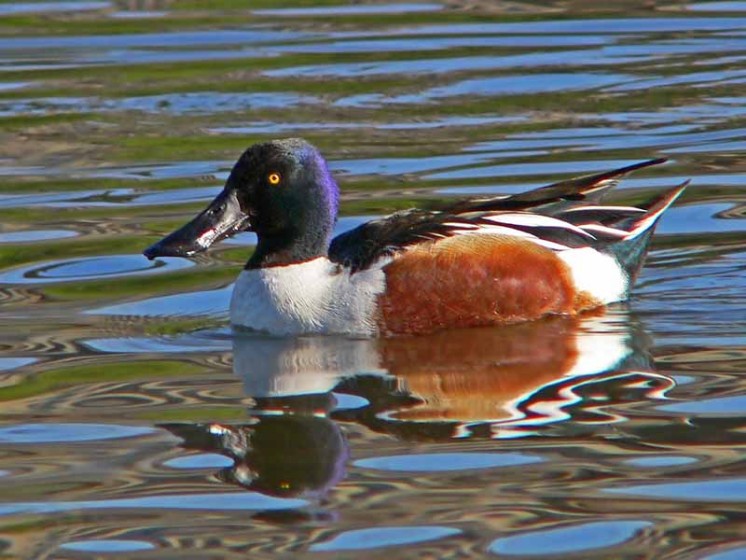Shoveler
Reports

On Saturday 9 November 2024 in the morning, there was a report of a male Shoveler on the pond at Port na Lochan. Later that day there was a male Shoveler on the other side of the island on Mossend Pond. It is likely to have been the same bird. Shoveler is a rare vagrant to Arran. The last Arran report was a male by Fisherman's Walk on 24 May 2015. The records held by the Arran Natural History Society show only four previous reports this century, two in 2012, one in 2011 and one in 2009. Prior to that there is one report from 1996 and one from 1991, “first record for thirty-five years or more”. There has never been a confirmed breeding record.
Living up to its name, the Shoveler has a large and distinctive shovel-like bill which it uses to feed at the surface of the water. As its broad spatula-shaped bill might suggest, the Shoveler is a rather specialised feeder feeding on zooplankton. World-wide there are four species of shoveler. Three are found in the southern hemisphere and one in the northern hemisphere, correctly called the Northern Shoveler and known simply in Britain as the Shoveler.
As well as the distinctive bill there are other noteworthy features. Males have dark green heads, with white breasts and chestnut flanks. Females are mottled brown. In flight, birds show patches of light blue and green on their wings. In the UK, they breed in southern and eastern England, especially around the Ouse Washes, the Humber and the North Kent Marshes and in much smaller numbers in Scotland and western parts of England. In the UK, it is a relatively scarce and localised breeder. Winter numbers are swelled by the arrival of wintering birds from further north and east.
In the northern hemisphere Shoveler is a common and widespread duck. It breeds in northern areas of Europe and across the Palearctic, stretching across all of Eurasia north of the foothills of the Himalayas and also across most of North America. It winters in southern Europe, the Indian subcontinent, Southeast Asia, Central America, the Caribbean and northern south America. Globally the conservation status of this bird is “Least Concern”.
On Arran it is a rare vagrant and this November a male Shoveler hung about Mossend Pond for several days enabling a number of people to enjoy this special bird. It was last reported on Thursday 14 November